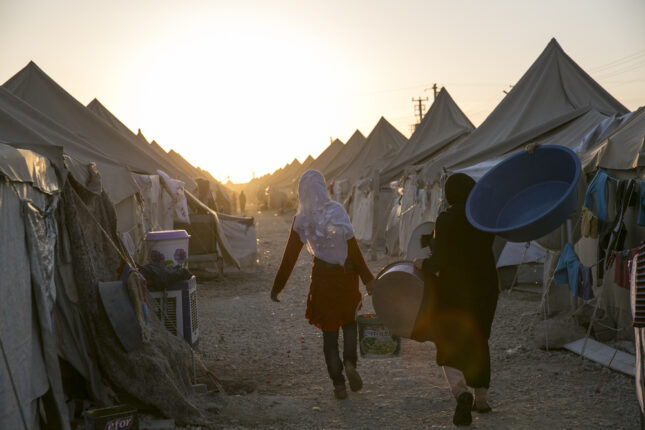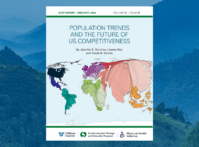-
Humanity Beyond Borders
April 17, 2024 By Rhea Kartha
“The health care challenges faced by refugees and displaced people are complex and multi-dimensional,” said John Thon Majok, Director of the Wilson Center’s Refugee and Forced Displacement Initiative (RAFDI). “This requires not only understanding the drivers of displacement but also analysis of the barriers to healthcare as well as innovative ways to address them.”
Majok was speaking at a recent book launch event, hosted by RAFDI, in partnership with the Maternal Health Initiative, of Muhammad H. Zaman’s book, We Wait for a Miracle: Health Care and the Forcibly Displaced.
The power of storytelling allows Zaman to push past statistics to humanize the profound healthcare disparities faced by some of the world’s most vulnerable populations. His new work delves into the narratives and lived experiences of refugees and displaced people in accessing the health care they need.
The author shared that the book’s title was inspired by the feelings of frustration and despair he has often heard from displaced persons who feel helpless to improve their circumstances and are unable to find opportunities for a better life. It also reflects a sentiment that only a supernatural event, a miracle, can offer them hope. Zaman noted that the true miracle is when people who know the problem and have the power to do something about it, take action.
The We Wait for a Miracle event highlighted three key factors that influence access to health care in refugee and forcibly displaced populations: presence or lack of trust between a provider and a patient, the existence and depth of a social network, and the current policy environment for refugees and humanitarian aid in each specific context.
What Role Does Trust Play?
Trust forms the foundation of the patient–provider relationship and greatly influences healthcare seeking habits for displaced populations—including refugees, internally displaced persons (IDPs), and stateless individuals—as well as the host community.
“Trust in many ways goes into their social network, and we see that people who have some kind of a social network are able to do better than people who are often in isolation and then don’t have any sort of connectivity,” Zaman said.
In Lebanon, Zaman found that Palestinian and Syrian communities sought healthcare from different providers, despite living in close proximity. This behavior stemmed from differences in trusted services and networks. Members of the Syrian community had an extensive social communication network with people like taxi drivers, who could obtain medications from trusted pharmacists in their network.
Forcibly displaced populations face additional barriers to seeking health services due to both their refugee status and misinformation that often associates refugees with disease and crime. In reality, refugees contribute to local economies, bringing skills and hard work that benefit host communities, improving economic conditions in the process, said Dr. Paul B. Spiegel, Director at the Johns Hopkins Center for Humanitarian Health. In some cases, he added, refugees and displaced people receive better health care from external aid organizations than members of the host community receive from their own country’s healthcare system. Such disparities can lead to “anti-refugee” sentiment and underscore the importance of addressing healthcare needs focused on vulnerabilities within the entire community, rather than solely based on refugee or displaced status.
Megan Daigle, Senior Research Fellow at the Humanitarian Policy Group of ODI observed that trust must be leveraged where it exists and built where it does not. Her research looks at the potential of community-led models of care, as well as the value of de-medicalizing some health services and promoting self-care—especially when it might be more beneficial and better received in the community. Her research also found that community-led models of care helped people overcome some of the barriers they were encountering as they tried to access healthcare.
What Makes Life Livable?
Despite best intentions of aid workers and donors, panelists noted that refugees and displaced people often find humanitarian aid dehumanizing. “Humanitarians tend to concern themselves with bare survival, but we need to be thinking much more about what makes life livable,” said Daigle.
This expanded notion of what services should be includes maternal, neonatal, and reproductive health services and Aid organizations tend to fall short in these settings, leaving people feeling even more alienated and at an increased risk of adverse health outcomes related to pregnancy and childbirth. “This is counter to the principle of humanity as it’s enshrined in the foundations of humanitarian response,” Daigle added.
Women and girls have historically faced discrimination while seeking sexual and reproductive health care in humanitarian settings. They often encounter discrimination and stigmatization when accessing care that is perceived to deviate from traditional gender norms, such as contraception outside of marriage, safe abortion services, or tubal ligation services, said Daigle. LGBTQI+ individuals and people with disabilities also struggle to access tailored healthcare services due to negative societal perceptions and historical denial of bodily autonomy.
Strides have been made towards providing respectful care, however, particularly regarding family planning and contraception. Zaman noted that today’s family planning models have shifted away from compelling women to limit childbearing to two children. That previous top-down approach dictated by wealthy countries has been replaced by interventions that are more holistic and focus on overall sexual and reproductive health.
Dr. Spiegel observed that in order to ensure long-term trust and harmony, humanitarian approaches must examine how forcibly displaced populations can be integrated into host communities to ensure mutual benefits in communication, education, and economic contribution. These efforts must work at the intersection of humanitarian relief, development programs, and peacebuilding to build long-term solutions, which are particularly important in the wake of increasing climate-related migration and other disruptions.
Zaman urged the audience to view humanitarian assistance and support as a fundamental aspect of being human, rather than an act of pity. And Majok left listeners with the advice to clean the mirror enough so that we can see ourselves and those who are invisible. And the invisible are the displaced people, the stateless, the refugees.
Sources: Council on Foreign Relations, Inter-Agency Working Group (IAWG), ODI, OXFAM, Reproductive Health Journal, World Bank.
Photo Credit: General view from Akcakale Refugee Camp. Tolga Sezgin/Shutterstock.com.
 A Publication of the Stimson Center.
A Publication of the Stimson Center.






